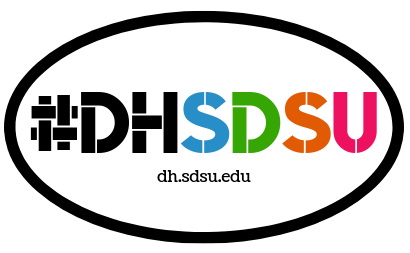DH@SDSU was founded on a mission to make DH about social equity and to take a global perspective in this quest. We can use Digital Humanities to not only think critically about the digital but to also build a better world. In our current cultural climate, such work is particularly vital. News headlines from June 2020– about Black Lives Matter, the global Covid19 pandemic and how it affects communities of color to a larger degree, the Supreme Court rulings on DACA and LGBTQ discrimination– remind us of the urgency of making our teachings relevant, embodied, and enacted.
Here are some of our favorite DH collectives and projects dedicated to social justice and activism. Below are suggested lessons for incorporating these projects into your classes.
Collectives:
- FemTechNet: FemTechNet is an activated network of hundreds of scholars, students, and artists who work on, with, and at the borders of technology, science, and feminism in a variety of fields including Science and Technology Studies (STS), Media and Visual Studies, Art, Women’s, Queer, and Ethnic Studies. Launched in 2012, the network has developed and experimented with collaborative processes to address the educational needs of students interested in feminist science-and-technology studies.
- Social Justice and the Digital Humanities is “a conversation on designing best practices for digital humanities praxis committed to social justice” (by Roopika Risam, in Scalar); this website and collective were developed out of the “De/Post/Colonial DH” course Humanities Intensive Learning and Teaching (HILT) 2015, taught by Roopika Risam and micha cárdenas.
Projects & Resources:
- Black Digital Humanities Projects & Resources: an amazing list of Black DH projects and databases, from Digital Harlem (University of Sydney, Australia) to Lynching in America (Equal Justice Project) to the Slave Voyages Database (Emory University) to Freedom on the Move, a database of fugitives from North American slavery. Spend some time here!
- FemTechNet Critical Race and Ethnic Studies Pedagogy Workbook is “an ongoing project to build resources for faculty members who are often overburdened at their home institutions, but are willing to take on the difficult task of teaching about gender and racial inequity in our information culture.”
- “Public Secrets” Sharon Daniel and Erik Loyer (2007): an oral history digital project that takes us inside the massive prison-industrial complex in central California to witness the testimonies of women incarcerated in the Central California Women’s Facility.
- Teaching #BlackLivesMatter: Countering the Pedagogies of Anti-Black Racism collaborative Google doc created during 2014 event at The Graduate Center, CUNY.
- Torn Apart/Separados (Manan Ahmed, Alex Gil, Moacir P. de Sá Pereira, Roopika Risam, Maira E. Álvarez, Sylvia A. Fernández, Linda Rodriguez, and Merisa Martinez – 2018): aggregates and cross-references publicly available data to visualize the geography of Donald Trump’s “zero tolerance” immigration policy in 2018 and immigration incarceration in the USA in general. We also draw attention to the landscapes, families, and communities riven by the massive web of immigrant detention in the United States.
Readings:

Sample Lessons:
- Feminist Wiki-Storming (from FemTechNet): “Students who take the responsibility to create or edit Wikipedia pages where shortcomings have been identified make the crucial step from observer to shaper of the public discourse.” This website has resources for implementing a wiki-storming activity into your class. It is not hard to do, and it can be very empowering for students! Consider including a wikipedia edit-a-thon in your class!
- Read coverage of the feminist wiki-storming in Mother Jones , “Can These Students Fix Wikipedia’s Lady Problem?” (2013)
- Afro Free Culture Wikimedia (AfroCROWD) Edit-a-thons: “AfroCROWD is a Wikimedia initiative to increase the number of people of African descent who actively take part in Wikimedia and free knowledge, culture, and software movements.” Instructors who are teaching more racially and ethnically diverse classes can also help add to the project by contributing to the WikiProject African Diaspora.
Faculty point of contact:
- Pam Lach (Digital Humanities Librarian). plach@sdsu.edu
